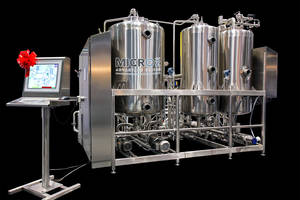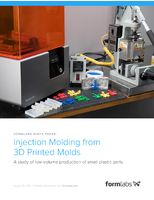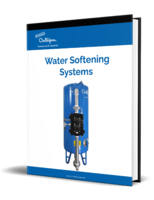New MicrO2 Blending System Utilizes Sparging Technology for Injecting CO2 into Blended Product
Press Release Summary:

- Delivers DO levels of 0.1 ppm for sugary soft drinks and 0.3 ppm for diet soft drinks
- Suitable for CSD beverage manufacturers filling steel or aluminum cans and PET or glass bottles
- Blends and carbonates 50 to 180 gal per minute and equipped with MicroBlend’s standard tanks
Original Press Release:
Bevcorp Introduces New MicrO₂ for Carbonated Soft Drinks
May 21, 2019 – Bevcorp’s MicroBlend division introduces their MicrO₂ Advantage Series Blending System for carbonated soft drinks (CSD) at Pack Expo Las Vegas booth #LS-6302. This patent-pending technology deaerates blended product to achieve significantly lower dissolved oxygen (DO) and nitrogen levels than traditional blending systems that feed can and bottle fillers. With lower DO levels, MicrO₂ supports higher filling speeds, improves fill weight control to increase yields, reduces operating costs and helps retain superior flavor over the shelf life of the packaged beverage.
“As the world’s only carbonated soft drink blending system that deaerates blended product, MicrO₂ is a game changer. Customers with installed systems are very excited about the technology and the benefits they’re experiencing,” said Jay Exley, Director of Operations at MicroBlend. “The sparging process that MicrO₂ uses to deaerate is similar to what the beer industry has done for years, except we’ve accelerated the process and developed other innovations that make it suitable for CSD manufacturers as well as winemakers and other beverage manufacturers.”
Unlike systems that deaerate prior to blending, MicrO₂ deaerates fully-blended product. Compared to traditional systems that deliver DO levels of 1.8 parts per million (ppm) to the filler, MicrO₂ typically delivers DO levels of 0.1 ppm for sugary soft drinks and 0.3 ppm for diet soft drinks. With MicrO₂, MicroBlend guarantees a DO level of 0.8 ppm or less for packaged product, even if the filler picks up oxygen during the filling process. Modern fillers with pre-purge systems and older fillers that have been modified with a basic bowl purge will minimize the reintroduction of oxygen after MicrO₂ to maintain DO levels of 0.1 to 0.3 ppm in the packaged product.
Reducing DO levels improves the stability of the beverage during packaging. With less foaming, MicrO₂ supports higher filling speeds, allows for higher product temperatures to reduce refrigeration costs and improves net weight control to increase yields. Lower product volatility also minimizes opportunities for expelled gases to be reintroduced, which keeps DO levels down during filling, and results in greater CO₂ consistency.
A further benefit of MicrO₂ is that reduced DO levels in the packaged product helps to maintain the flavor of the beverage throughout its expected shelf life and potentially provides increased shelf life.
MicrO₂ is perfect for CSD beverage manufacturers filling steel or aluminum cans as well as PET or glass bottles. It is ideal for use with cans that feature new, first-generation BPA-NI (BPA non-intent) liners that are more susceptible to DO than BPA-lined cans. This is particularly important when using cans from canmakers that guarantee “no leakers” only for filled cans with DO levels less than 1.2 ppm.
Traditional blending systems use either CO₂, vacuum or membrane technology to deaerate the water prior to blending. This allows the DO that is naturally present in the syrup to be introduced to the blended product and results in higher DO levels. Even if the syrup is deaerated prior to blending, the latent volatility of traditionally blended product picks up oxygen and results in elevated DO levels.
The proprietary MicrO₂ process uses sparging technology to inject CO₂ into blended product to deaerate the entire mix and achieve low DO levels. Most of the CO₂ used to deaerate is retained, at which time the system increases pump pressure and injects the additional required CO₂ to carbonate the product to the customer’s specifications.
Additionally, by eliminating vacuum or membrane deaeration used on traditional systems, MicrO₂ offers a more compact footprint and presents fewer moving parts and fewer wear parts to reduce maintenance. With less energy and CO₂ consumption, MicrO₂ minimizes operating costs. Rebates associated with energy-saving programs may be available from utility providers before and/or after installation to further reduce investment costs and improve ROI.
Equipped with MicroBlend’s standard tanks, MicrO₂ blends and carbonates 50 to 180 gallons per minute. Larger, optional tanks enable MicrO₂ to produce up to 250 gallons per minute. The systems can typically be changed over to handle a new product in less than 10 minutes, depending on the size of the filler. With the addition of MicroBlend’s independent rinsing option, product changeovers can be accomplished in eight to eight-and-a-half minutes. Compared to traditional blending systems that require a vacuum deaerator or membranes to be cleaned, MicrO₂ offers an inherently more sanitary design because deaeration occurs within the filler’s normal CIP (clean-in-place) path.
Customers using other blending systems from MicroBlend may be eligible for a significant cost-savings trade-in when upgrading to MicrO₂ since some tanks, meters, sensors and other electronics can be repurposed.
About Bevcorp
Bevcorp has been a full-service provider of packaging equipment since 1992. We offer solutions for filling, blending, container handling and can seaming as well as parts and service. We guarantee unparalleled support, highlighted by our dedicated commitment to serving the food and beverage industries. Through our Bevcorp Filling, MicroBlend, FCI Handling and East Coast Seamers divisions, we provide a wide range of options to satisfy customers’ equipment and budgetary needs.
Reader Inquiries:
Kristen Hale, Inside Sales Manager
Bevcorp Filling
4711 East 355th Street
Willoughby, OH 44094 USA
Tel: +1 440 954 3500 x3167
khale@bevcorp.com
www.bevcorp.com
Editor Inquiries:
Sandra McBride
McBride Public Relations
5 Arastradero Road
Portola Valley, CA 94028 USA
Tel: +1 650 926 9852
connect@mcbridepr.com
www.mcbridepr.com




